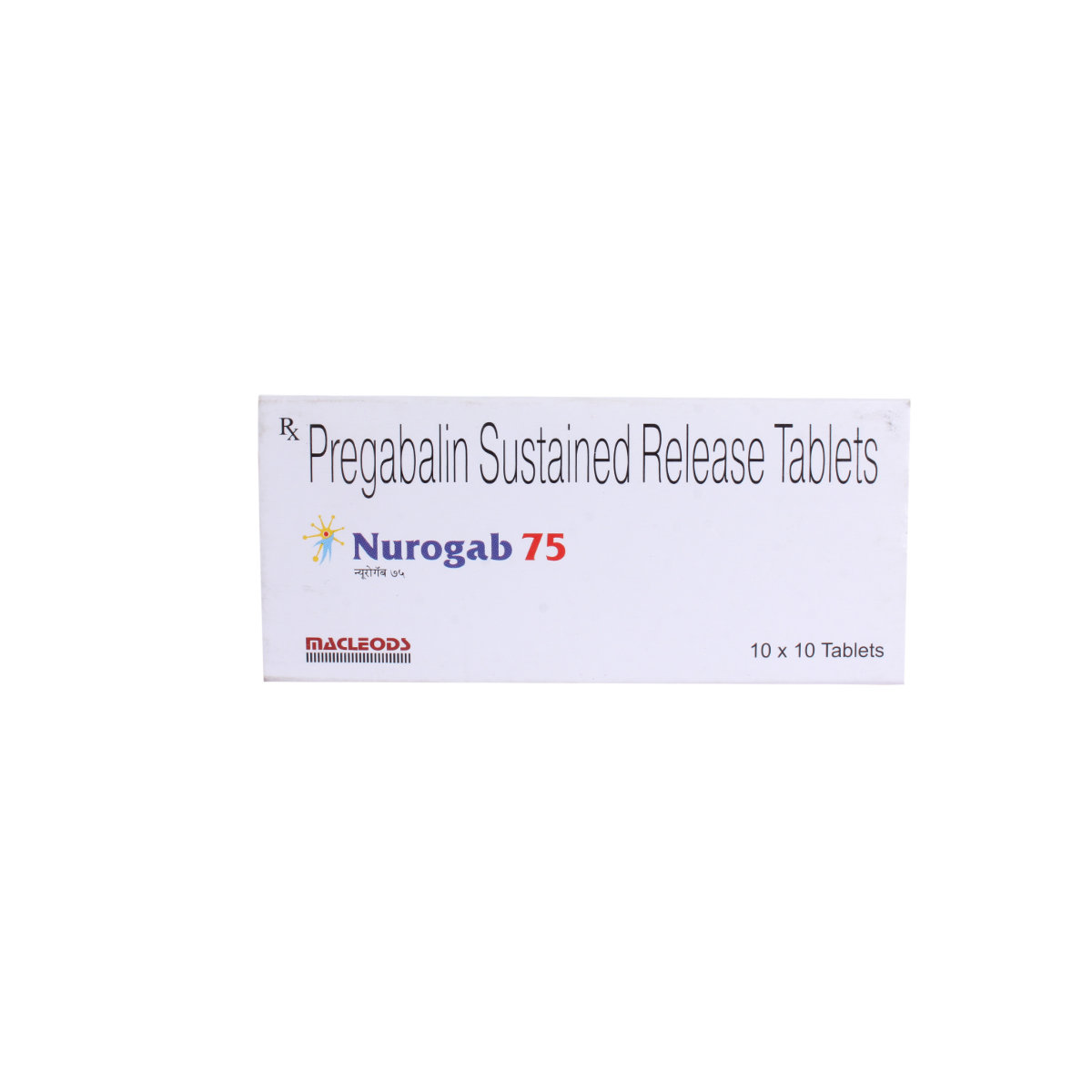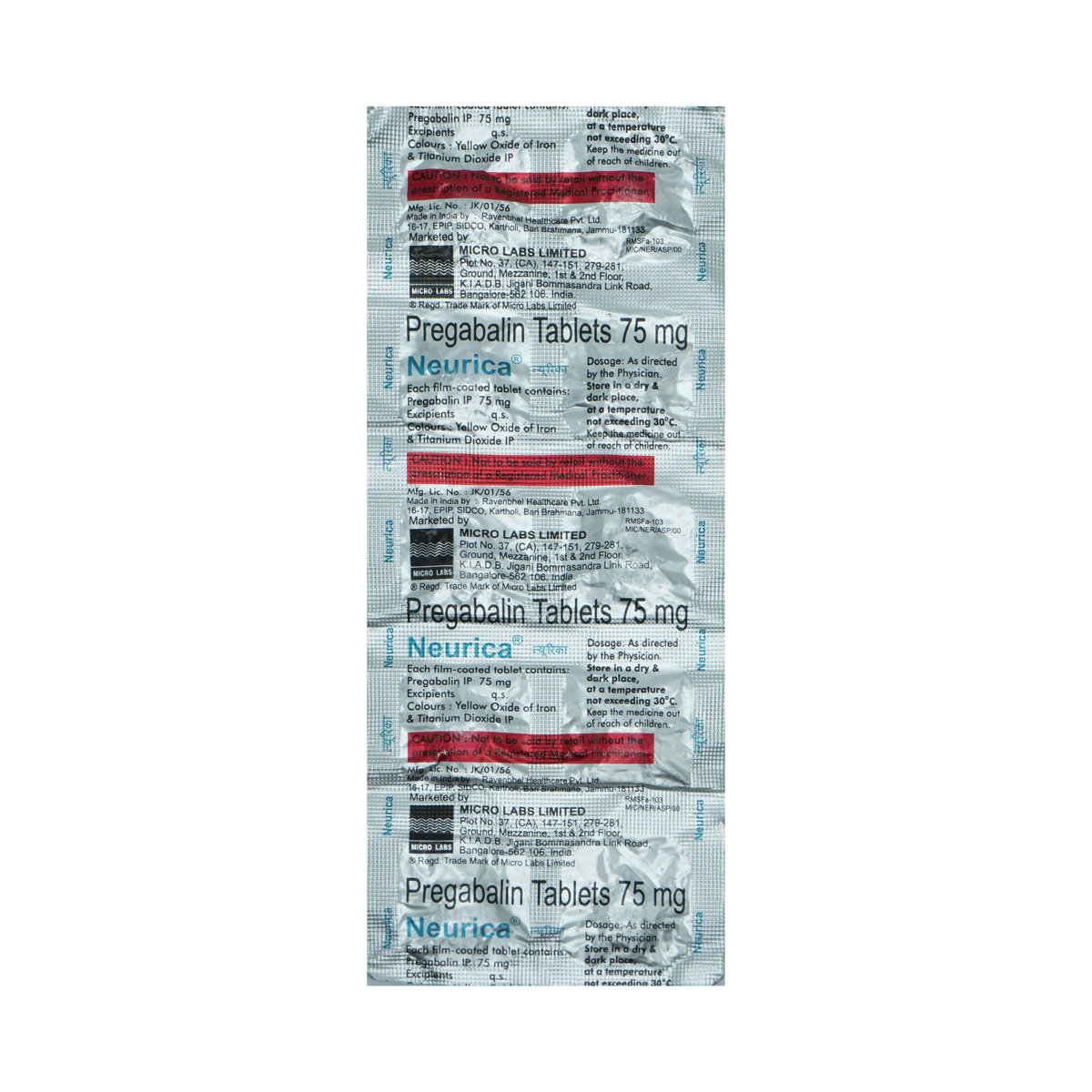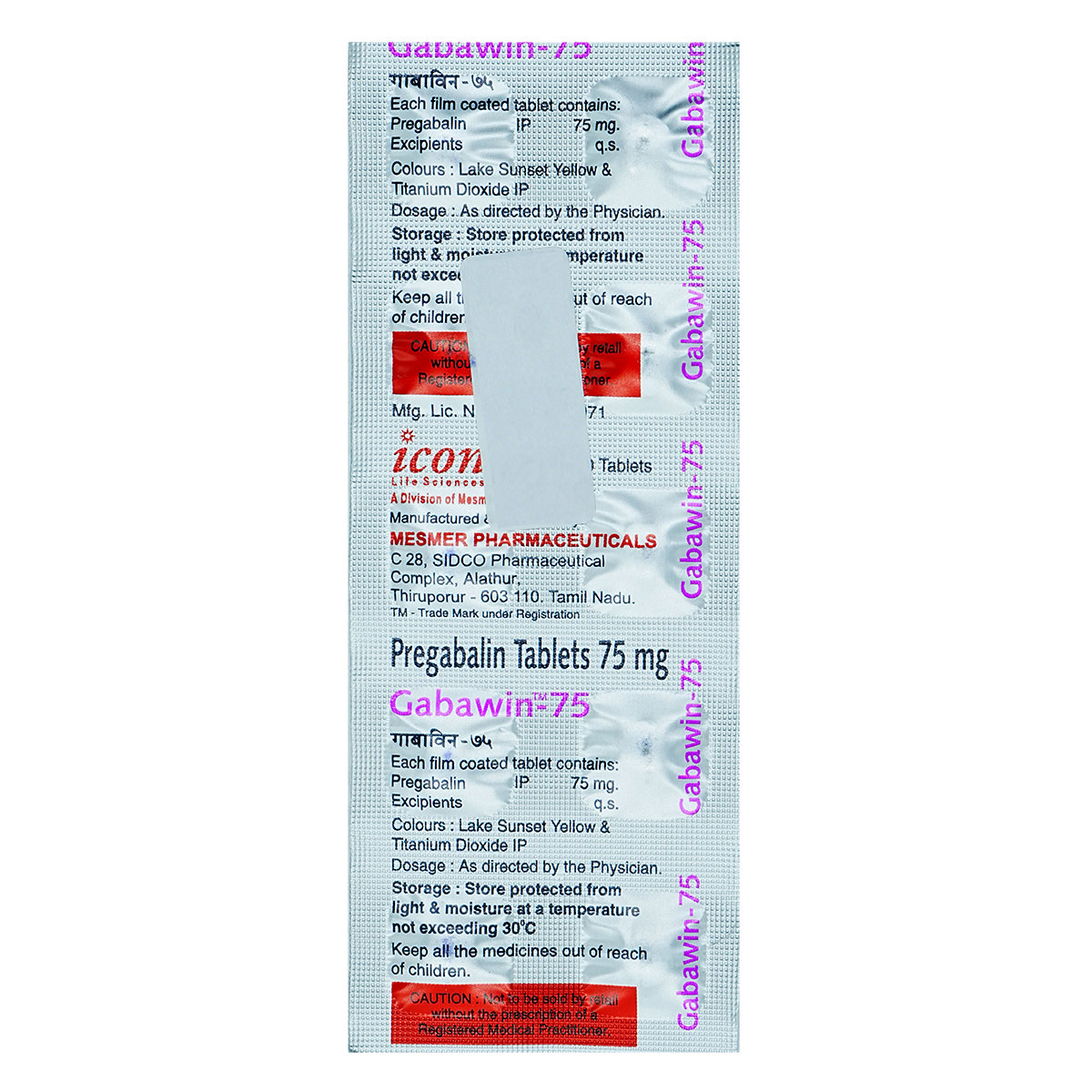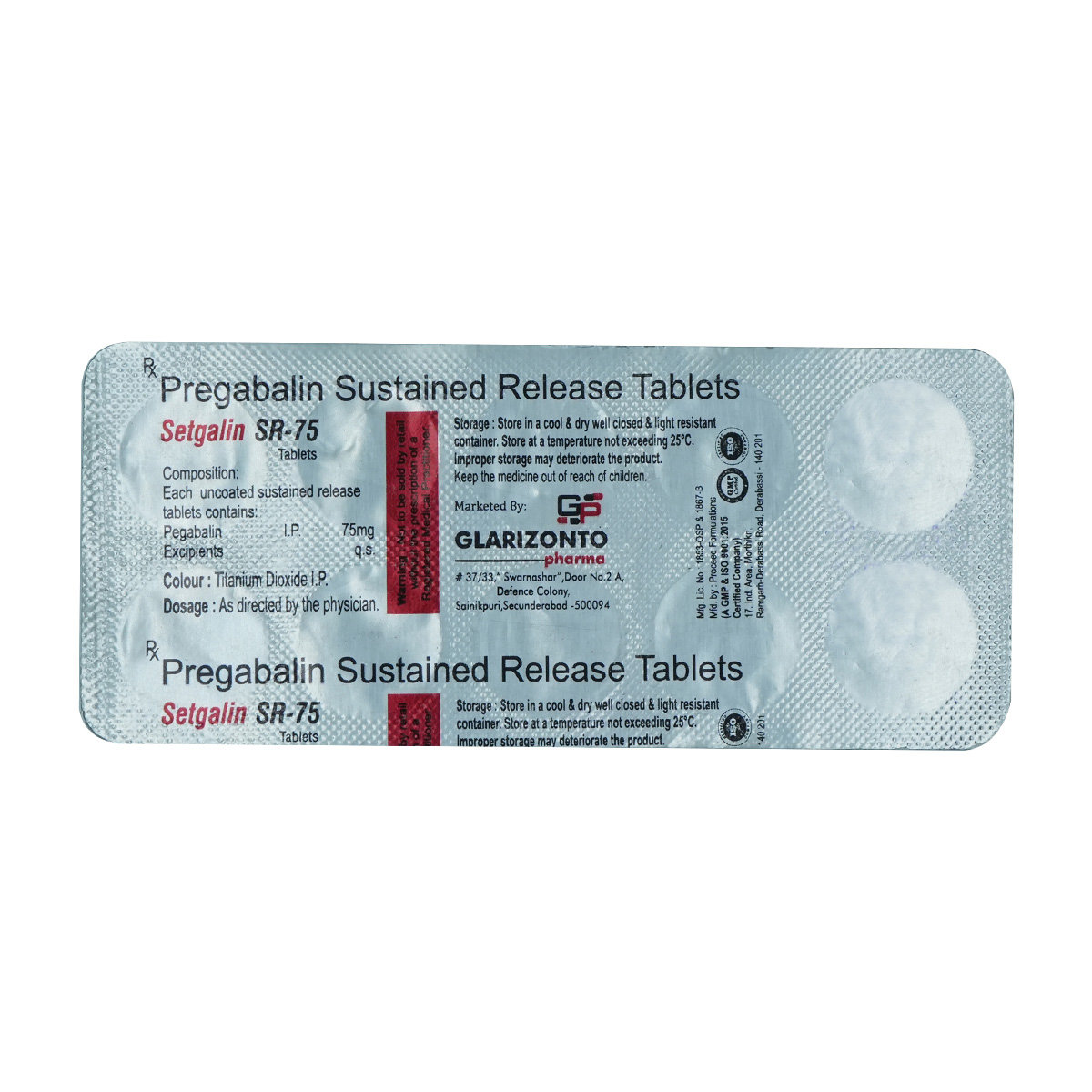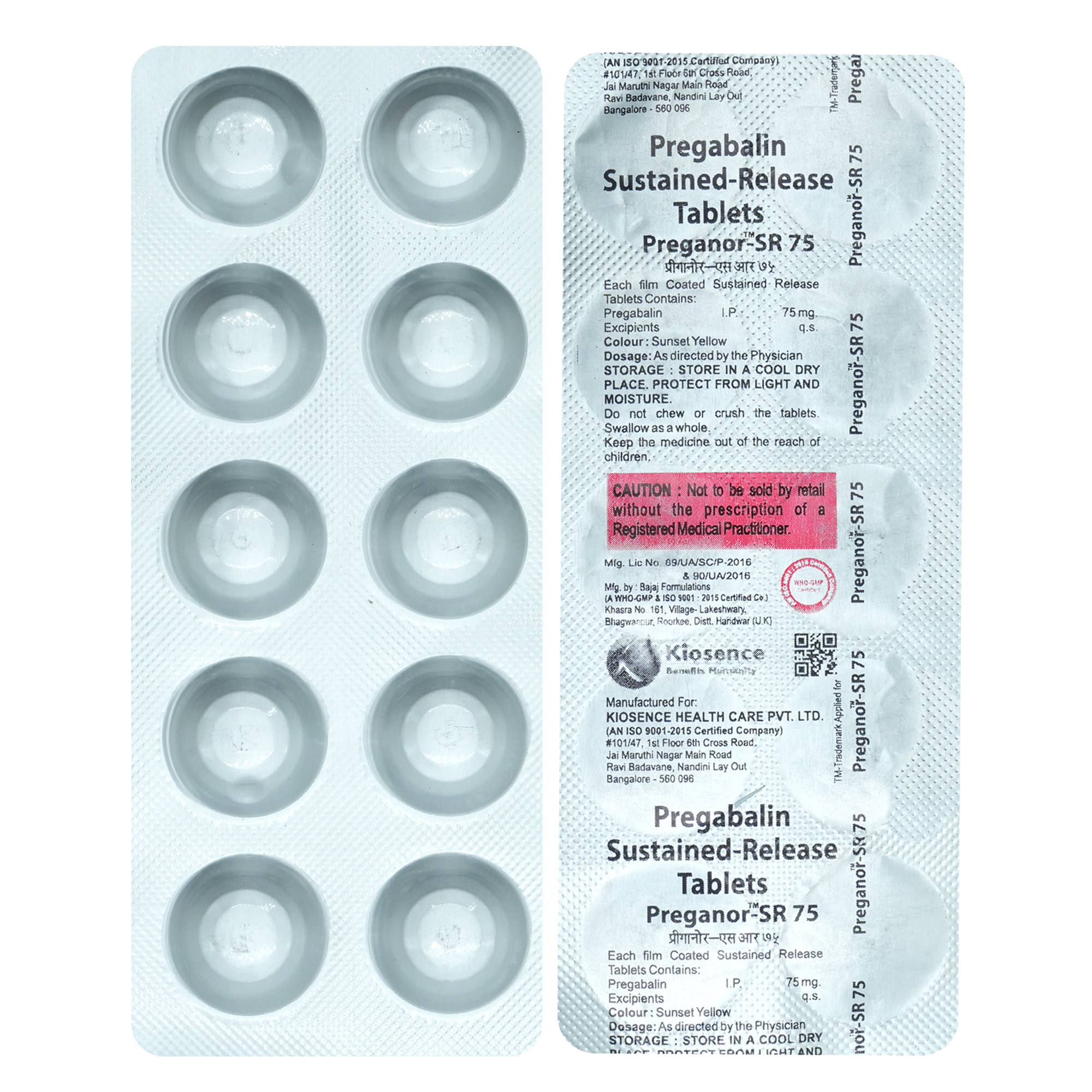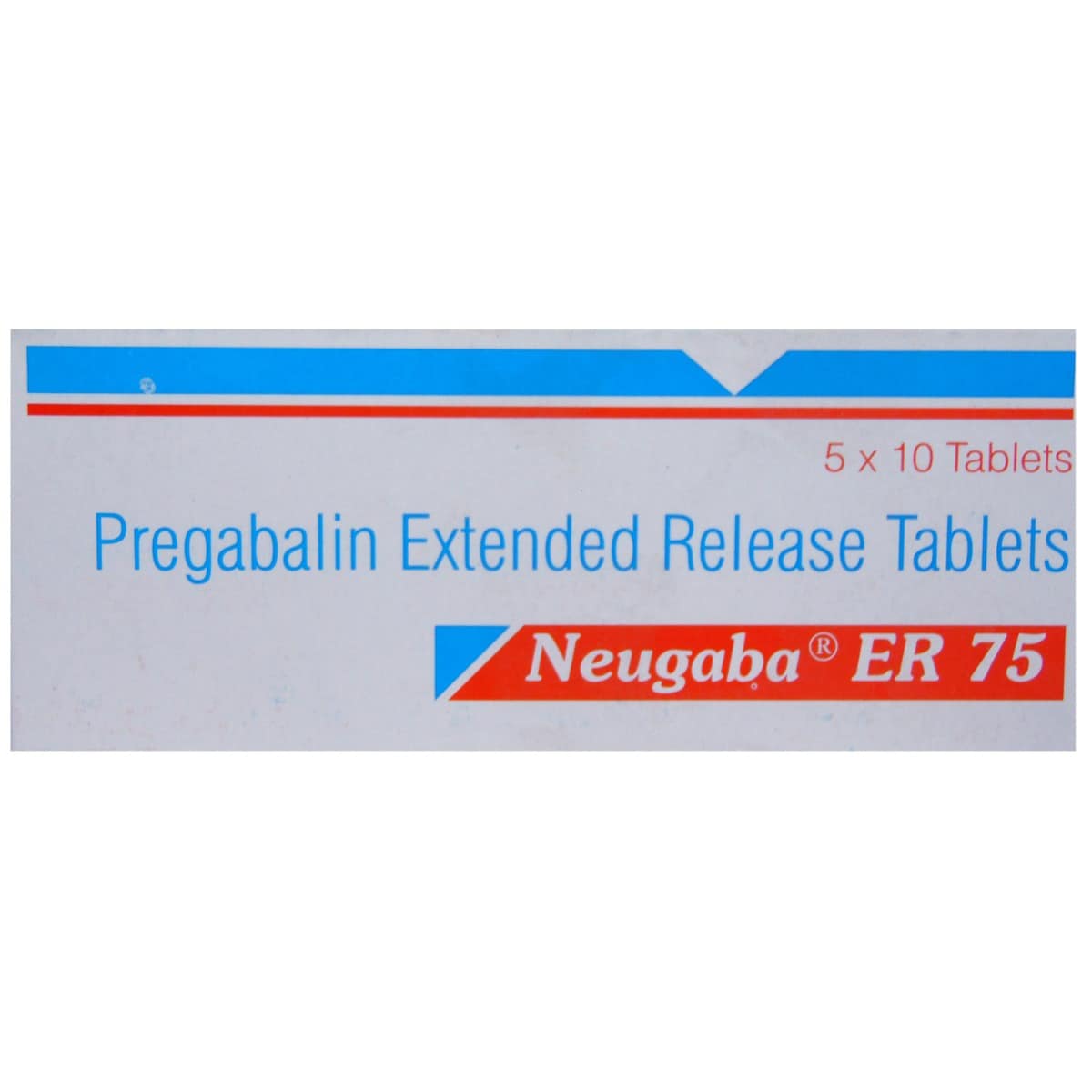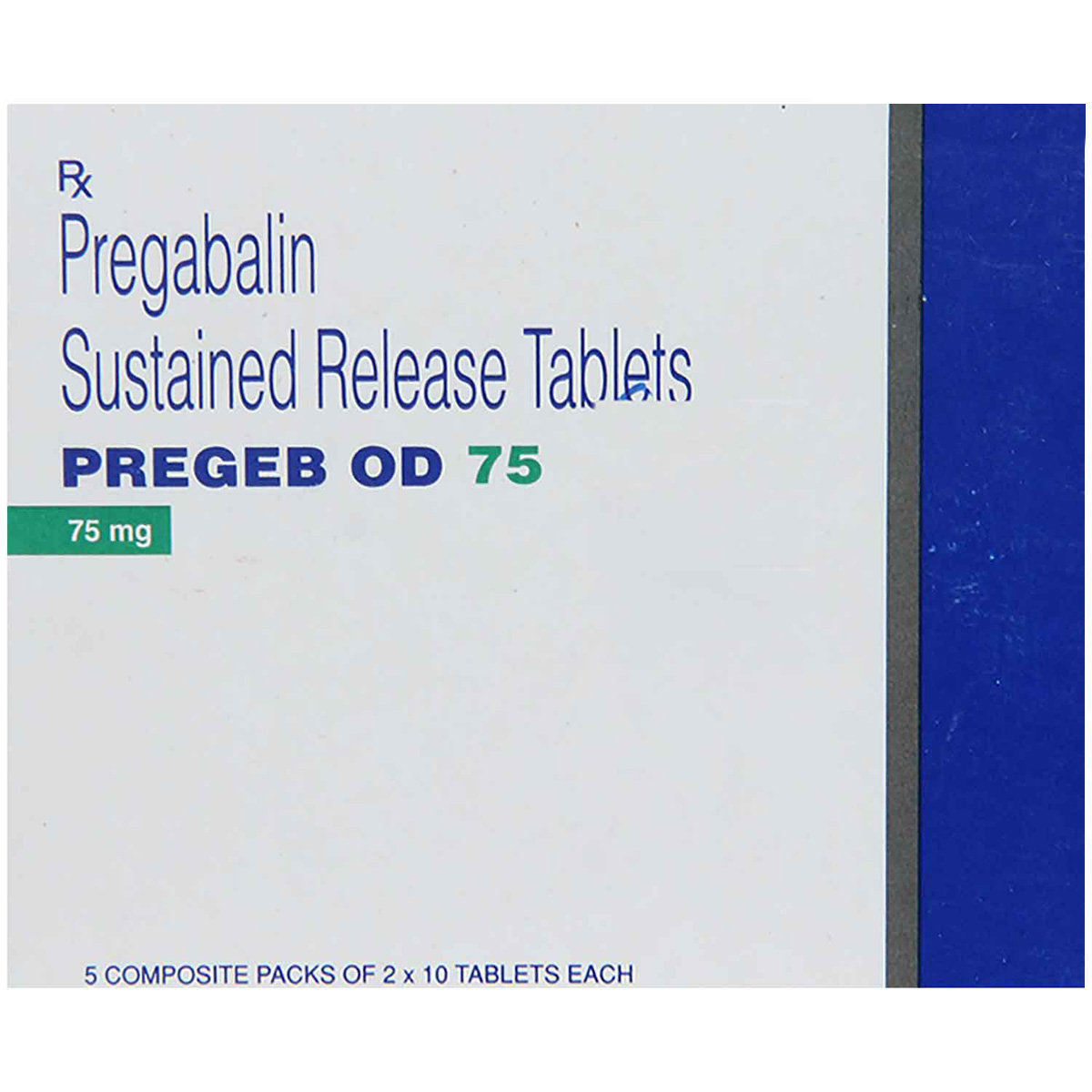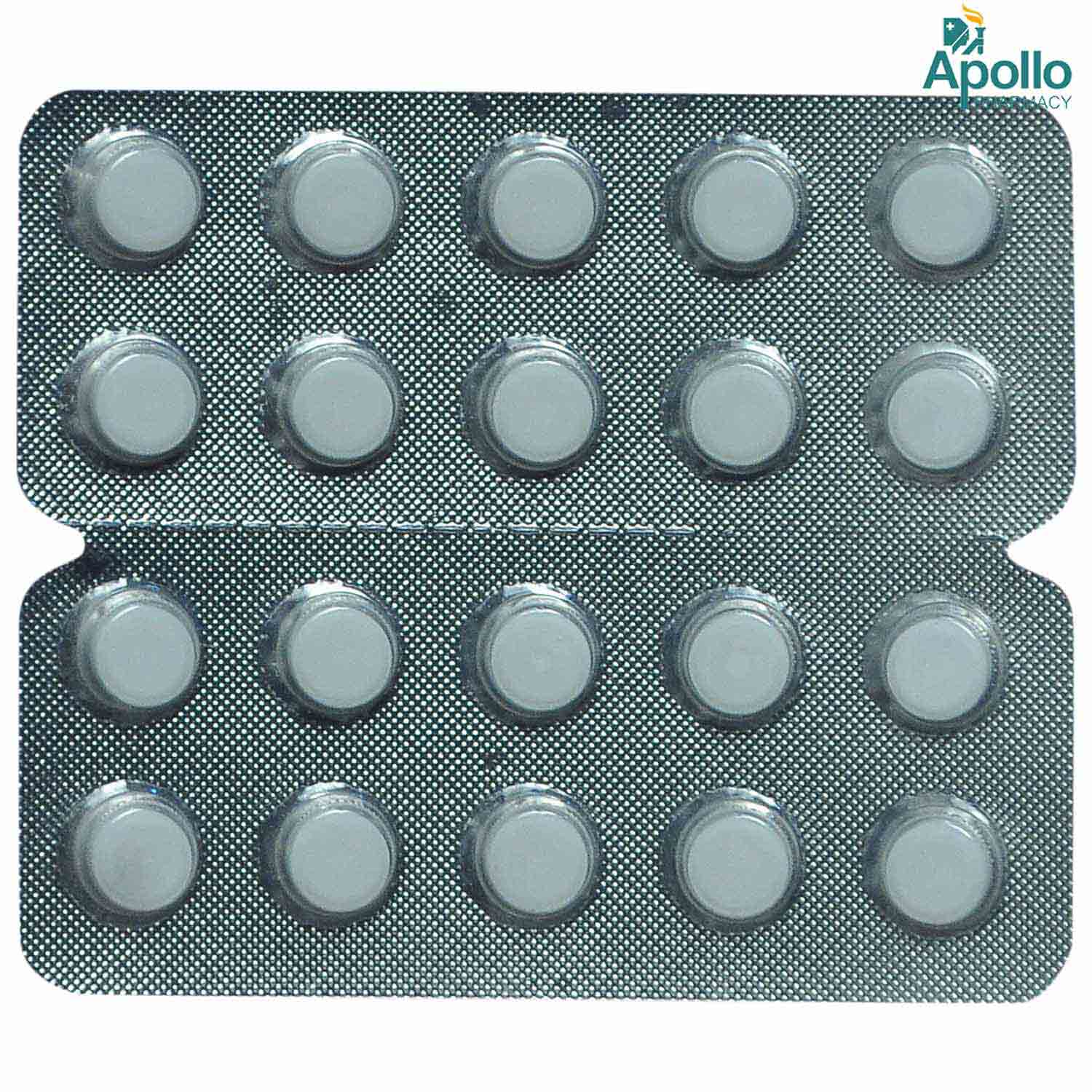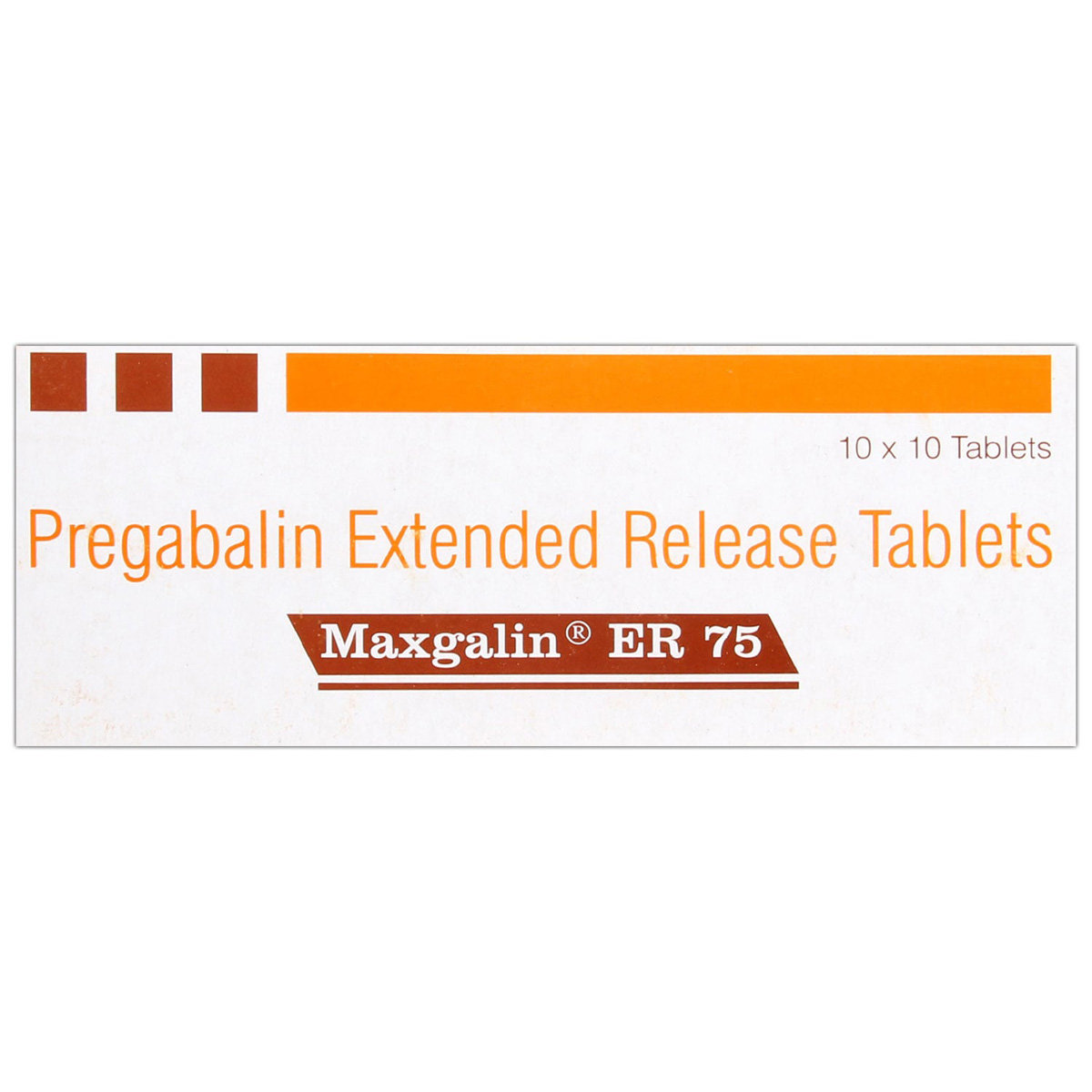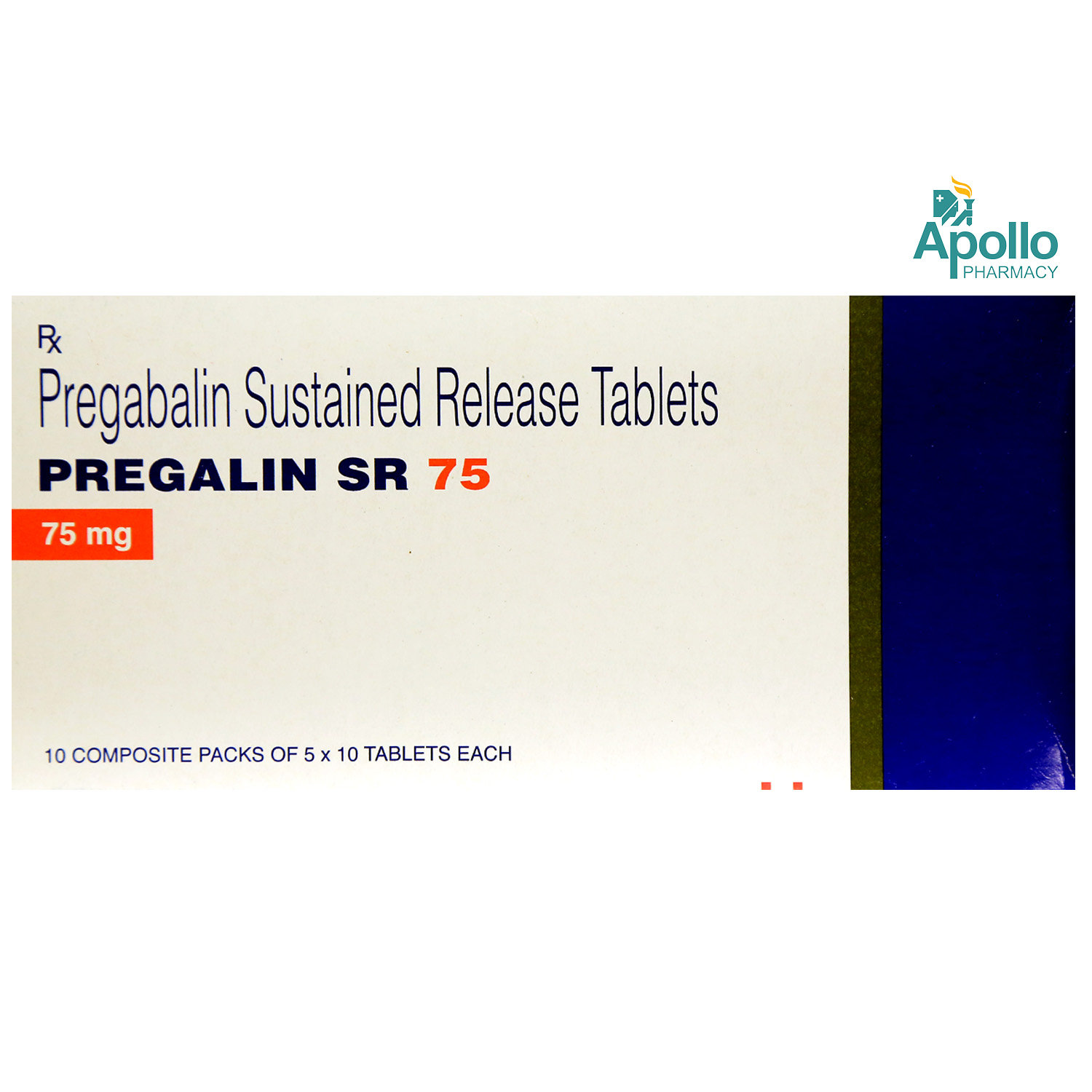Peg SR 75 Tablet
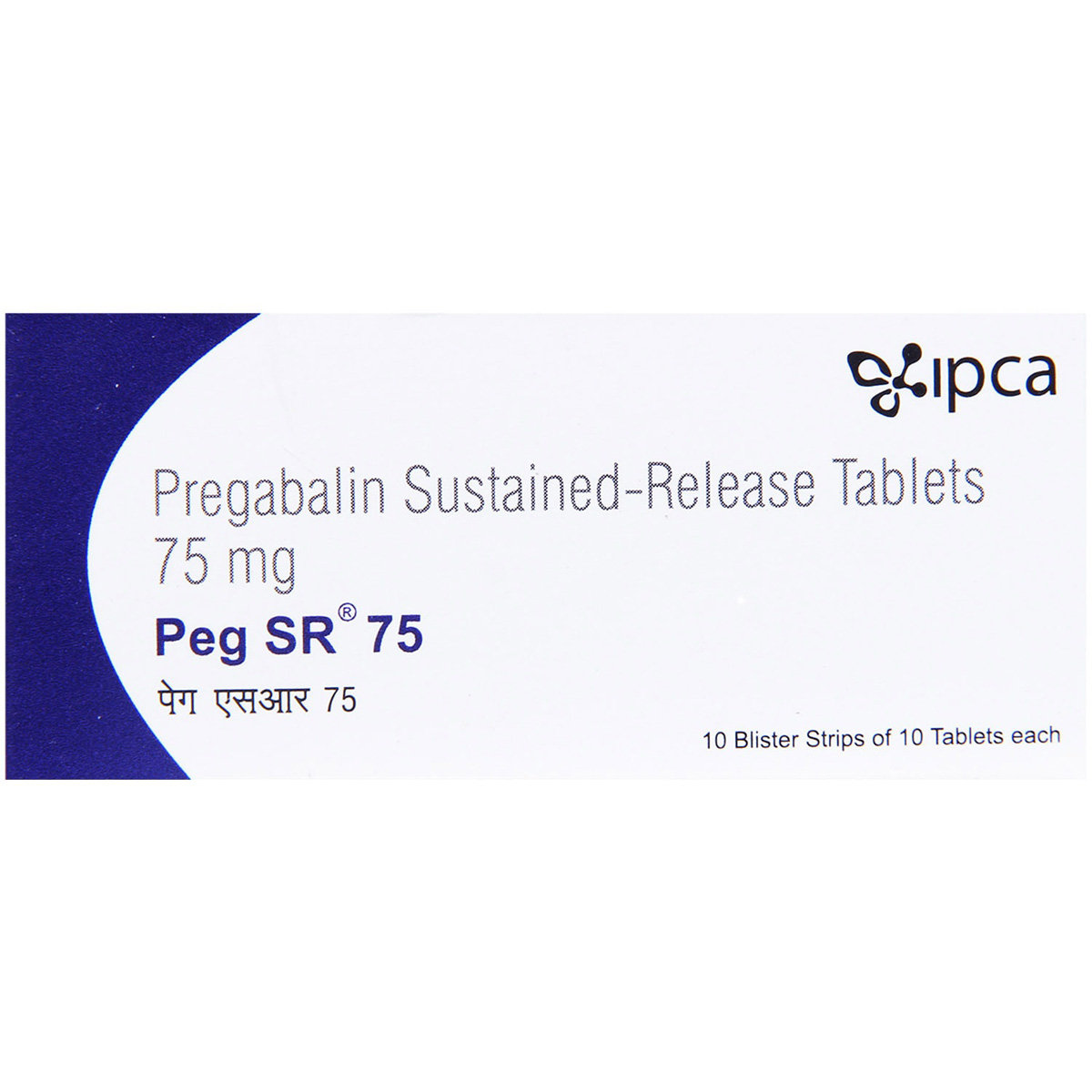
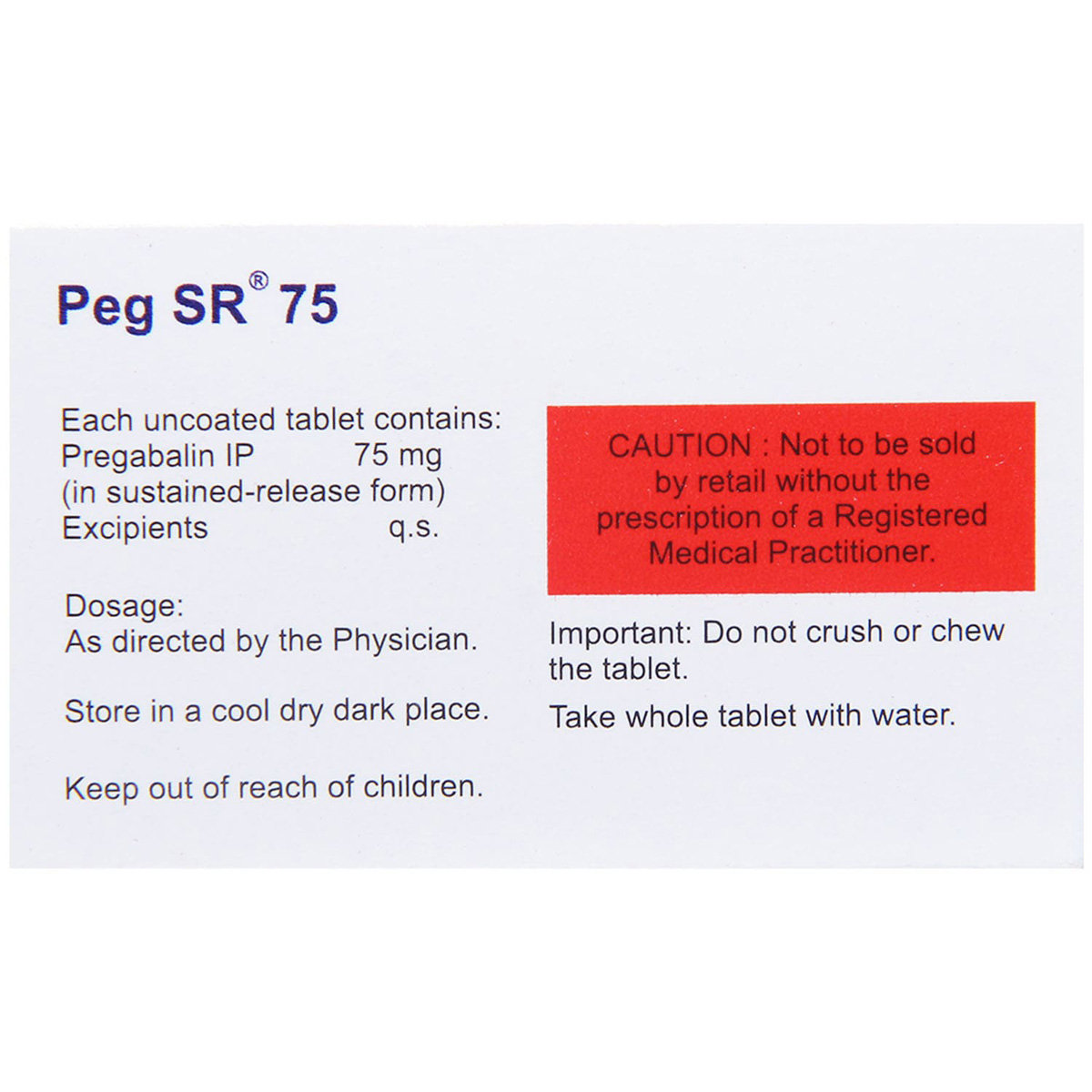
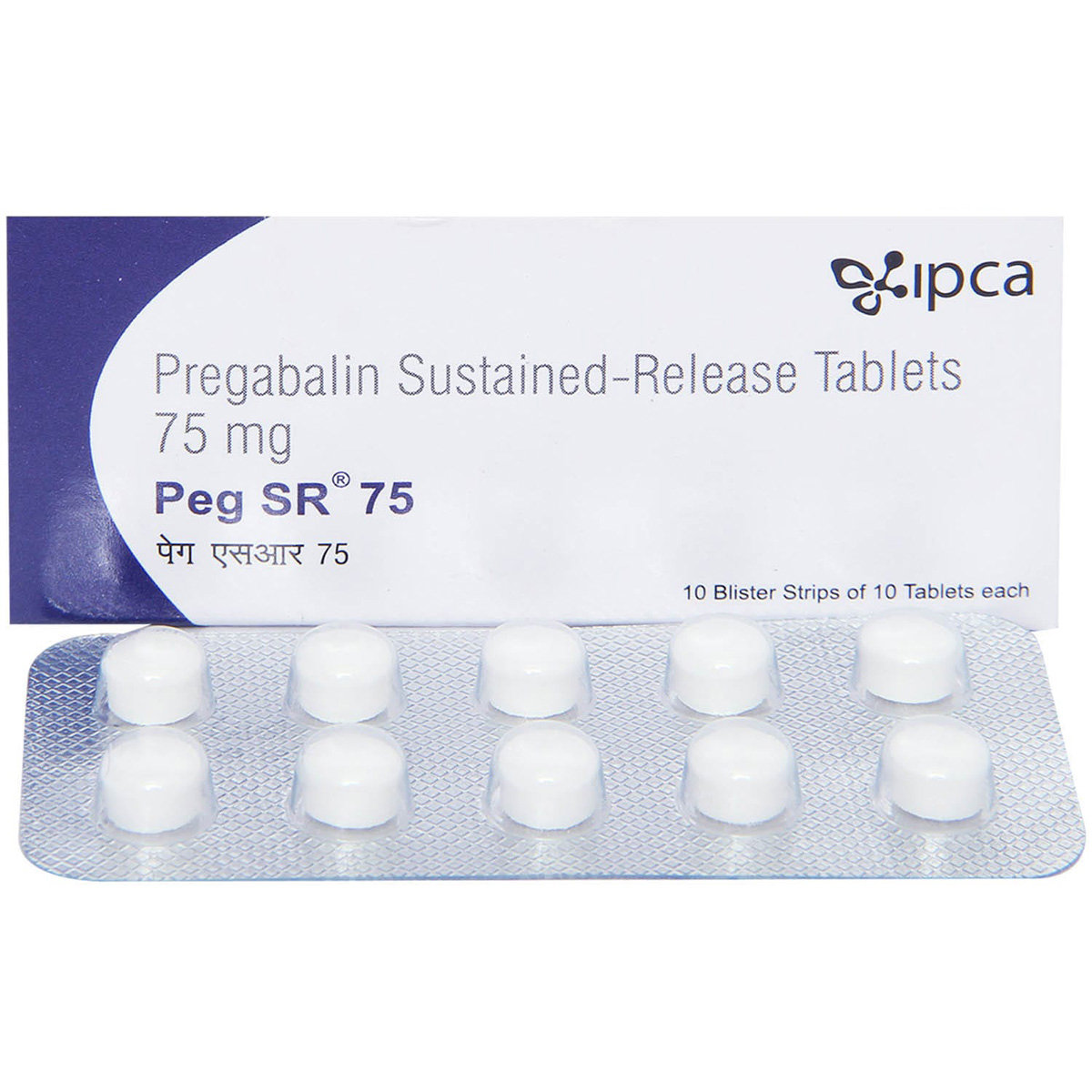

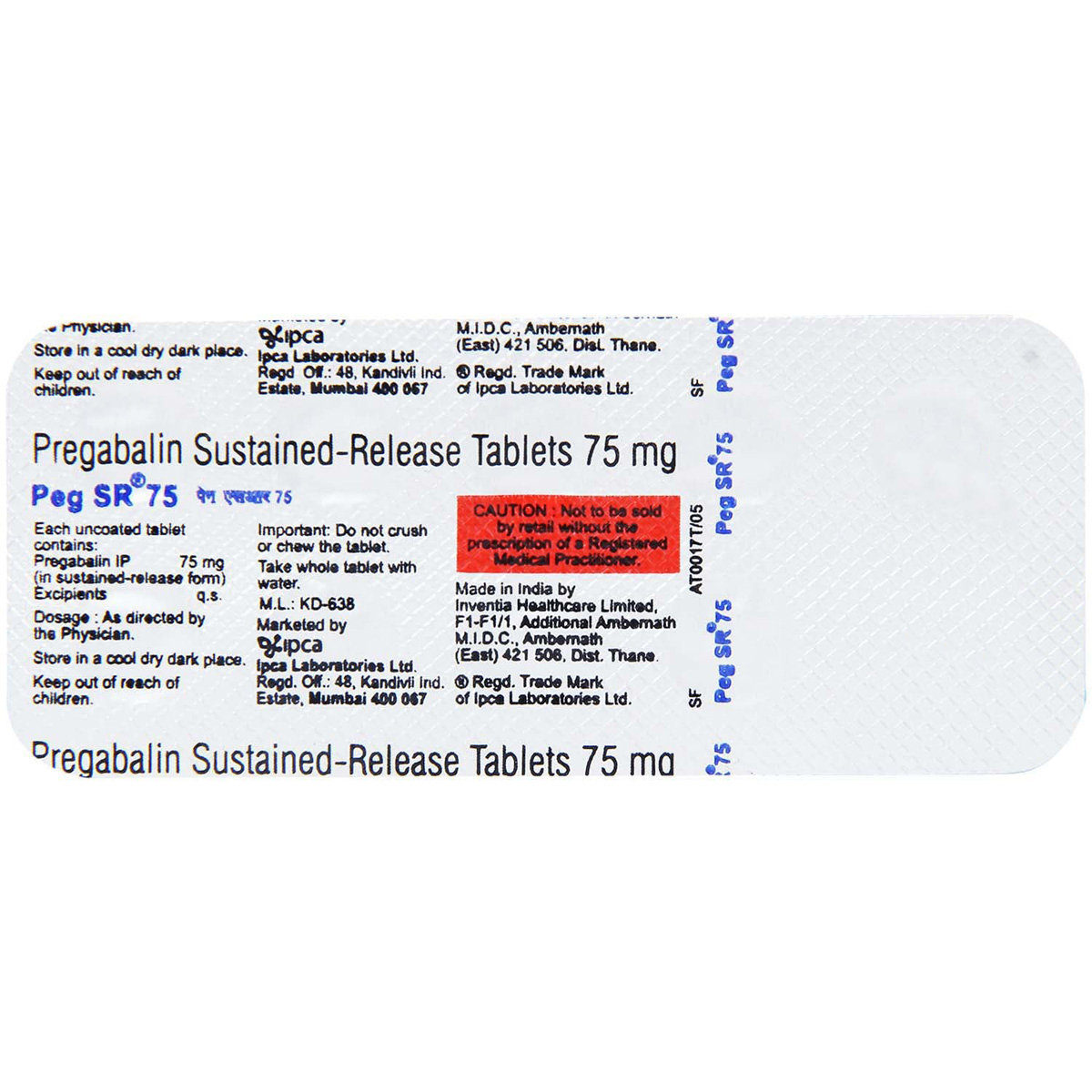
MRP ₹198.5
(Inclusive of all Taxes)
₹29.8 Cashback (15%)
know your delivery time
Provide Delivery Location
Composition :
Manufacturer/Marketer :
Consume Type :
Expires on or after :
Return Policy :

Secure Payment

Trusted by 8 Crore Indians

Genuine Products
Therapeutic Class
Country of origin
Manufacturer/Marketer address
Author Details
We provide you with authentic, trustworthy and relevant information
FAQs
Disclaimer
Alcohol
Safe if prescribed
It is unsafe to consume alcohol since it may worsen the side effects like dizziness and sleepiness.
Pregnancy
Consult your doctor
Peg SR 75 Tablet is a category C pregnancy drug. Please consult your doctor. Your doctor will weigh the benefits and potential risks before prescribing Peg SR 75 Tablet .
Breast Feeding
Consult your doctor
Peg SR 75 Tablet should be used in breastfeeding women only when prescribed by a doctor. Your doctor will weigh the benefits and potential risks before prescribing Peg SR 75 Tablet .
Driving
Safe if prescribed
Do not drive or operate machinery if you experience dizziness or drowsiness while using Peg SR 75 Tablet . Peg SR 75 Tablet can also sometimes cause blurry/double vision; hence avoid driving in such situations. Seek medical attention if the symptoms persist longer.
Liver
Consult your doctor
Take Peg SR 75 Tablet with caution, especially if you have or had a history of liver disease/conditions. The dose may be adjusted by your doctor as required.
Kidney
Consult your doctor
Take Peg SR 75 Tablet with caution, especially if you have or had a history of kidney disease/conditions. The dose may be adjusted by your doctor as required.
Children
Safe if prescribed
Peg SR 75 Tablet is not recommended for children below the age of 18 years. The safety and efficacy of Peg SR 75 Tablet have not been established.
Product Substitutes
About Peg SR 75 Tablet
Peg SR 75 Tablet belongs to a group of medications called 'anti-convulsants', primarily used in the prevention of neuropathic pain, epilepsy (seizure episodes), fibromyalgia (musculoskeletal pain), and neuralgia (pain due to damaged/irritated nerve). Neuropathic pain is chronic nerve pain usually caused by damaged nerves due to a variety of diseases like diabetes, shingles (viral infection that causes a painful rash), spinal cord injury, and injuries to tissue, muscles, or joints.
Peg SR 75 Tablet contains 'Pregabalin', which works by calming the damaged or overactive nerves in the body that may cause nerve or musculoskeletal pain or seizures. Besides this, it also decreases the number of pain signals sent out by damaged nerves in the body.
In some cases, Peg SR 75 Tablet might cause side effects like dizziness, somnolence (sleepiness/drowsiness), dry mouth, oedema (fluid overload with swelling), blurred vision, weight gain and abnormal thinking (difficulty with concentration/attention). Most of these side effects do not require medical attention. However, if the side effects persist or worsen, consult a doctor.
Tell your doctor if you are facing symptoms of suicidal ideation or behaviour, drug addiction, chronic pulmonary insufficiency, muscle pain, soreness, weakness, kidney, liver, or heart diseases. Caution is required before giving Peg SR 75 Tablet to pregnant or breastfeeding women. The safety and effectiveness in children less than 18 years of age have not been established, so Peg SR 75 Tablet should not be given to them.
Uses of Peg SR 75 Tablet
Medicinal Benefits Mweb
Key Benefits
Peg SR 75 Tablet belongs to a group of medications called 'anticonvulsants' used to prevent neuropathic pain (pain due to damaged nerves), fibromyalgia (musculoskeletal pain), and epilepsy (fits). It works by calming the damaged or overactive nerves in the body that may cause pain or seizures, thereby decreasing the number of pain signals sent out by damaged nerves in the body.
Directions for Use
Side Effects of Peg SR 75 Tablet
- Dizziness
- Somnolence (sleepiness/drowsiness)
- Dry mouth
- Oedema (fluid overload with swelling)
- Blurred vision
- Weight gain
Drug Warnings
Do not take Peg SR 75 Tablet if you are known to be allergic to any of its contents. Inform your doctor if you have symptoms of suicidal ideation or behaviour, drug addiction, chronic lung diseases, muscle weakness, heart problems, liver/kidney impairment. Caution is required before giving Peg SR 75 Tablet to pregnant or breastfeeding women. The safety and effectiveness of Peg SR 75 Tablet in children under 18 years of age have not been established, so Peg SR 75 Tablet should not be given to them. Taking Peg SR 75 Tablet with opioids analgesics or painkillers like oxycodone can cause respiratory failure, coma, and even leading to death, so avoid its intake together. If you are taking any sleeping pills or tranquillizers, tell your doctor about this as Peg SR 75 Tablet interacts with these drugs and causes sleepiness, drowsiness and dizziness and affects your daily activity. Immediately contact a doctor if you have swelling of your face, mouth, tongue, lips, gums, neck, or throat (angioedema).
Drug-Drug Interactions
Drug-Drug Interactions
Login/Sign Up
When Peg SR 75 Tablet and Esketamine are taken together, it may increase the risk of side effects.
How to manage the interaction:
Although taking Peg SR 75 Tablet and Esketamine together can result in an interaction, it can be taken if a doctor has prescribed it. However, if you experience symptoms such as drowsiness, confusion, difficulty concentrating, and impairment in thinking, judgment, reaction speed, and motor coordination. Do not exceed the doses, frequency, or duration of usage advised by a doctor. Avoid driving or operating dangerous machinery. Do not stop using any medications without talking to a doctor.
When Tramadol is used with Peg SR 75 Tablet, it may possibly lead to side effects such as respiratory difficulties, unconsciousness.
How to manage the interaction:
Although taking tramadol and Peg SR 75 Tablet together can result in an interaction, it can be taken if a doctor has prescribed it. However, if you experience impaired judgment, reaction time, and motor coordination, dizziness, sleepiness, and difficulty concentrating, consult the doctor immediately. Do not exceed the doses, frequency, or duration of usage advised by a doctor. Avoid driving or operating dangerous machinery. Do not stop using any medications without talking to a doctor.
Using Peg SR 75 Tablet together with Nalbuphine causes central nervous system depression (a physiological state that can result in a decreased rate of breathing, decreased heart rate and loss of consciousness).
How to manage the interaction:
Although taking Nalbuphine and Peg SR 75 Tablet together can result in an interaction, it can be taken if a doctor has prescribed it. However, if you experience impaired judgment, reaction time, and motor coordination, dizziness, sleepiness, and difficulty concentrating, consult the doctor immediately. Do not exceed the doses, frequency, or duration of usage advised by a doctor. Avoid driving or operating dangerous machinery. Do not stop using any medications without talking to a doctor.
Using Peg SR 75 Tablet together with Pethidine causes central nervous system depression (a physiological state that can result in a decreased rate of breathing, decreased heart rate and loss of consciousness).
How to manage the interaction:
Although taking pethidine and Peg SR 75 Tablet together can result in an interaction, it can be taken if a doctor has prescribed it. However, if you experience impaired judgment, reaction time, and motor coordination, dizziness, sleepiness, and difficulty concentrating, consult the doctor immediately. Do not exceed the doses, frequency, or duration of usage advised by a doctor. Avoid driving or operating dangerous machinery. Do not stop using any medications without talking to a doctor.
Using Peg SR 75 Tablet together with Dezocine causes central nervous system depression (a physiological state that can result in a decreased rate of breathing, decreased heart rate and loss of consciousness).
How to manage the interaction:
Although taking Dezocine and Peg SR 75 Tablet together can result in an interaction, it can be taken if a doctor has prescribed it. However, if you experience impaired judgment, reaction time, and motor coordination, dizziness, sleepiness, and difficulty concentrating, consult the doctor immediately. Do not exceed the doses, frequency, or duration of usage advised by a doctor. Avoid driving or operating dangerous machinery. Do not stop using any medications without talking to a doctor.
Using Sodium oxybate together with Peg SR 75 Tablet may increase the risk of side effects.
How to manage the interaction:
Although taking Peg SR 75 Tablet with Sodium oxybate together can result in an interaction, it can be taken if a doctor has prescribed it. However, if you experience drowsiness, dizziness, lightheadedness, confusion, slow or shallow breathing, and impairment in thinking, judgment, and motor coordination, consult the doctor. For at least six hours after taking sodium oxybate, avoid operating machinery or engaging in potentially dangerous activities. Also, be careful when getting up from a sitting or lying down posture. Do not stop using any medications without talking to a doctor.
Using Peg SR 75 Tablet together with Oxycodone causes central nervous system depression (a physiological state that can result in a decreased rate of breathing, decreased heart rate and loss of consciousness).
How to manage the interaction:
Although taking oxycodone and Peg SR 75 Tablet together can result in an interaction, it can be taken if a doctor has prescribed it. However, if you experience impaired judgment, reaction time, and motor coordination, dizziness, sleepiness, and difficulty concentrating, consult the doctor immediately. Do not exceed the doses, frequency, or duration of usage advised by a doctor. Avoid driving or operating dangerous machinery. Do not stop using any medications without talking to a doctor.
Using Peg SR 75 Tablet together with Fentanyl can increase the risk of side effects.
How to manage the interaction:
Although taking fentanyl together with Peg SR 75 Tablet can result in an interaction, they can be taken together if prescribed by a doctor. However, consult a doctor if you have dizziness, sleepiness, difficulty concentrating, or impairment in judgment. Do not stop taking any medication without consulting a doctor.
Using Peg SR 75 Tablet together with Butorphanol causes central nervous system depression (a physiological state that can result in a decreased rate of breathing, decreased heart rate, and loss of consciousness).
How to manage the interaction:
Although taking Butorphanol and Peg SR 75 Tablet together can result in an interaction, it can be taken if a doctor has prescribed it. If you experience impaired judgment, reaction time, and motor coordination, dizziness, sleepiness, and difficulty concentrating, consult the doctor immediately. Do not exceed the doses, frequency, or duration of usage advised by a doctor. Avoid driving or operating dangerous machinery. Do not stop using any medications without talking to a doctor.
Using Tapentadol together with Peg SR 75 Tablet may cause central nervous system depression (a physiological state that can result in a decreased rate of breathing, decreased heart rate, and loss of consciousness).
How to manage the interaction:
Taking Peg SR 75 Tablet with Tapentadol can result in an interaction, it can be taken if a doctor has advised it. Contact a doctor immediately if you experience signs such as drowsiness, lightheadedness, palpitations, confusion, severe weakness, or difficulty breathing. Do not exceed the doses or frequency and duration of use advised by the doctor. Do not discontinue any medications without consulting a doctor.
Drug-Food Interactions
Drug-Food Interactions
Login/Sign Up
Drug-Diseases Interactions
Drug-Diseases Interactions
Login/Sign Up
Drug-Drug Interactions Checker List
- MORPHINE
- FENTANYL
- OXYCODONE
- TRAMADOL
- CODEINE
- LORAZEPAM
- DIAZEPAM
- CLONAZEPAM
Habit Forming
Special Advise
Do not take Peg SR 75 Tablet for a prolonged time; it may lead to mental or physical dependence on Peg SR 75 Tablet .
Diet & Lifestyle Advise
- Maintain a diet rich in fruits, vegetables, whole grains, omega-3 rich foods. Avoid fried foods, high-fat dairy products, pastries, and processed foods, as they may worsen neuropathic pain.
- Do regular exercise and maintain a healthy weight.
- Avoid the consumption of alcohol as it may increase dizziness or drowsiness.
All Substitutes & Brand Comparisons
RX
Not for online saleNurogab 75 Tablet 10's
Macleods Pharmaceuticals Ltd
₹90
(₹8.1 per unit)
54% CHEAPERRX
Not for online saleMaglin-75 Tablet 10's
T Banko Genic Pharma
₹140.5
(₹12.65 per unit)
29% CHEAPERRX
Not for online salePregalift ER 75 Tablet 10's
Linux Laboratories Pvt Ltd
₹143.5
(₹12.92 per unit)
27% CHEAPER

Have a query?
Buy best C.n.s Drugs products by
Intas Pharmaceuticals Ltd
Sun Pharmaceutical Industries Ltd
Torrent Pharmaceuticals Ltd
Alkem Laboratories Ltd
Abbott India Ltd
Cipla Ltd
Alteus Biogenics Pvt Ltd
Micro Labs Ltd
Lupin Ltd
Ipca Laboratories Ltd
D D Pharmaceuticals Pvt Ltd
Icon Life Sciences
Mankind Pharma Pvt Ltd
Tripada Healthcare Pvt Ltd
Arinna Lifesciences Ltd
Linux Laboratories Pvt Ltd
East West Pharma India Pvt Ltd
La Renon Healthcare Pvt Ltd
Talent India Pvt Ltd
Tas Med India Pvt Ltd
Zydus Healthcare Ltd
Cnx Health Care Pvt Ltd
Eris Life Sciences Ltd
Leeford Healthcare Ltd
Emcure Pharmaceuticals Ltd
Macleods Pharmaceuticals Ltd
Sigmund Promedica
Aristo Pharmaceuticals Pvt Ltd
Dr Reddy's Laboratories Ltd
Troikaa Pharmaceuticals Ltd
Consern Pharma Ltd
Zydus Cadila
Shine Pharmaceuticals Ltd
Wockhardt Ltd
Ardent Life Sciences Pvt Ltd
Crescent Formulations Pvt Ltd
Theo Pharma Pvt Ltd
Reliance Formulation Pvt Ltd
Ikon Pharmaceuticals Pvt Ltd
Propel Healthcare
Neon Laboratories Ltd
Jagsam Pharma
Msn Laboratories Pvt Ltd
Morepen Laboratories Ltd
Pulse Pharmaceuticals
Sanofi India Ltd
Med Manor Organics Pvt Ltd
Hetero Healthcare Pvt Ltd
Novartis India Ltd
Crescent Therapeutics Ltd
Elder Pharmaceuticals Ltd
Solvate Laboratories Pvt Ltd
Akumentis Healthcare Ltd
Mova Pharmaceutical Pvt Ltd
Psyco Remedies Ltd
Tripada Lifecare Pvt Ltd
Ajanta Pharma Ltd
Cyrus Remedies Pvt Ltd
Medishri Healthcare Pvt Ltd
Cadila Healthcare Ltd
Glenmark Pharmaceuticals Ltd
Matteo Health Care Pvt Ltd
Hbc Life Sciences Pvt Ltd
Lyf Healthcare
Matias Healthcare Pvt Ltd
Mesmer Pharmaceuticals
Alembic Pharmaceuticals Ltd
Capital Pharma
Crescent Pharmaceuticals
Medopharm Pvt Ltd
Alniche Life Sciences Pvt Ltd
Kivi Labs Ltd
Talin Remedies Pvt Ltd
USV Pvt Ltd
Quince Lifesciences Pvt Ltd
Solis Pharmaceuticals
Infivis Life Care
Zuventus Healthcare Ltd
Cadila Pharmaceuticals Ltd
Pfizer Ltd
Wallace Pharmaceuticals Pvt Ltd
A N Pharmacia Laboratories Pvt Ltd
Blue Cross Laboratories Pvt Ltd
Jenburkt Pharmaceuticals Ltd
Lia Life Sciences Pvt Ltd
Mano Pharma
Medley Pharmaceuticals Ltd
Primus Remedies Pvt Ltd
FDC Ltd
Maneesh Pharmaceuticals Ltd
Apex Laboratories Pvt Ltd
Gagnant Healthcare Pvt Ltd
Ozone Pharmaceuticals Ltd
RPG Life Sciences Ltd
Strides Shasun Ltd
Unichem International
GlaxoSmithKline Pharmaceuticals Ltd
Kuresys Labs Pvt Ltd
LA Pharma
Trion Pharma India Llp


